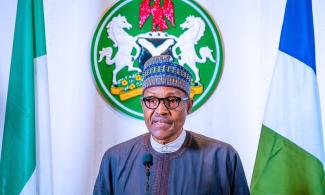
The President disclosed this on Friday while presenting a record N20.51 trillion 2023 appropriation bill to the National Assembly.
President Muhammadu Buhari says many economies around the world are currently contending with fiscal instability, slow growth, food crisis, and high-interest rates as a result of the ongoing war between Russia and Ukraine.
The President disclosed this on Friday while presenting a record N20.51 trillion 2023 appropriation bill to the National Assembly.
The National Assembly had approved the medium-term expenditure framework (MTEF) and fiscal strategy paper (FSP) — parameters on which the 2023 budget will be framed.
While presenting the details, Buhari said the 2023 transition budget was designed to address critical issues and lay a solid foundation for the incoming administration.
He said despite his continuing efforts, unemployment, underemployment, and poverty rates remain high in the country.
“Distinguished Senators and Honourable Members, despite continuing efforts, unemployment, underemployment, and poverty rates remain high. We are currently implementing several skills development programmes and work opportunity programmes to enhance the employability of our youths and tackle the troubling level of youth unemployment,” Buhari said.
“While it is evident that our economy still faces significant challenges, what could have happened without the implementation of some of the measures we introduced, would have been much worse for the country.
“Distinguished and Honourable Members of the National Assembly, the implementation of the 2022 ‘Budget of Economic Growth and Sustainability commenced on the first day of the year. It was, however, necessary to forward an amended budget proposal to address some exigent issues, especially the significant increase in fuel subsidy.
“The amended 2022 Budget was based on a benchmark oil price of 73 US Dollars per barrel, oil production of 1.60 million barrels per day, and exchange rate of 410.15 Naira to US Dollar.
“As at 31st July 2022, Federal Government’s retained revenue was 3.66 trillion Naira, excluding the revenue of Government-Owned Enterprises. Thus, revenue collection was only 63 percent of our target, largely due to the underperformance of oil and gas revenue sources.
“Despite higher oil prices in 2022, oil revenue was below target due to significant oil production shortfalls and high petrol subsidy cost resulting from the significant rise in Crude prices which ultimately increased PMS prices worldwide.
“Oil output stood at an average of 1.30 million barrels per day as at June 2022, while the sum of 1.59 trillion Naira was spent on fuel subsidy between January and June 2022. The NNPC, working in collaboration with security and other relevant agencies, is putting in place additional measures to curb the incidence of pipeline vandalism and crude oil theft in order to meet our crude oil production quota.
“On the expenditure side, the sum of 8.29 trillion Naira had been spent by July 31 2022 out of the total appropriation of N17.32 trillion. Despite our revenue challenges, we have consistently met our debt service commitments. Staff salaries and statutory transfers have also been paid as and when due.
“Total non-debt recurrent expenditure in January to July 2002 was 3.24 trillion Naira, of which 2.87 trillion Naira was for Salaries, Pensions and Overheads. A total of 3.09 trillion Naira was spent on debt service obligations during the period.
“Furthermore, about 1.48 trillion Naira had been released to MDAs for capital expenditure as at the end of July 2022. I am pleased to inform you that we expect to fund MDAs’ capital budget fully by the end of the fiscal year 2022.”